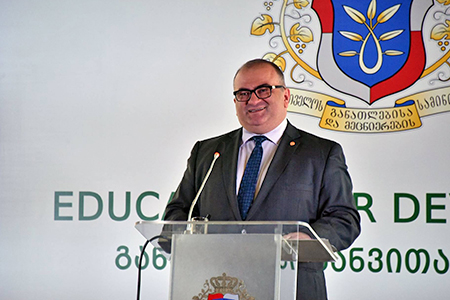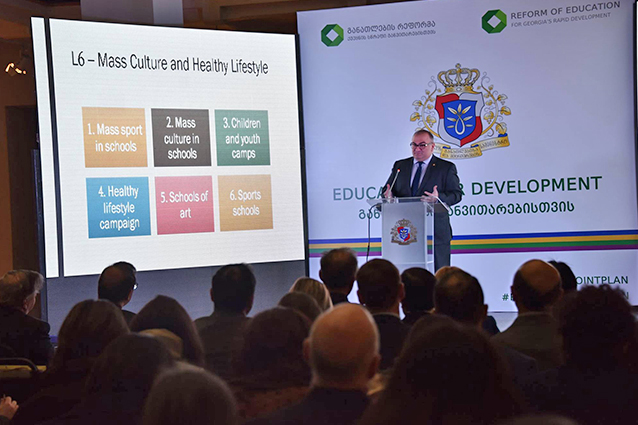Minister Jejelava introduces upcoming changes to Georgian education system

The Georgian education system is preparing a series of changes to allow for more flexibility in schools and to promote student-guided learning.
Georgian Education Minister Aleksandre Jejelava introduced the upcoming changes to Georgia’s education system with the diplomatic corps and international organisations in Georgia’s capital of Tbilisi today.
General Education
Jejelava believes more free hours need to be introduced to primary schools to make the classes more interesting and interactive along with the general subjects the students are learning on a daily basis.
The minister said the number of mandatory subjects will be decreased to give students more space for expressing themselves so that along with the quality education they will also develop critical thinking skills.
Increased number of sport and art classes will aim at helping kids stay in good health and shape.

Vocational Education
Minister Jejelava believes professional education is an important precondition for finding jobs relevant to one’s qualifications. He said the vocational colleges running in different regions of Georgia including Tbilisi provide a number of opportunities to students who want to acquire skills in certain trades that interest them.
10,000 students chose vocational education last year… We think professional education becomes more and more popular year after year”, Jejelava said.
37 colleges in Georgia offer over 150 professions free of charge. Without being limited to any specific age group, the colleges provide ample opportunities with state funding. The ministry is now working on improving the legislation to allow those with general and trade education to pursue higher education as well.
As of today, only those who successfully graduate from high school can apply to university.
Higher Education
The ministry says that high-quality universities are necessary in order to boost the economy. In particular, universities should prepare students in all fields that are in demand by the country.
We should do our best to make sure both Georgians and foreigners receive internationally approved diplomas in Georgia”, Jejelava said adding that there are over 10,000 foreign students studying in Georgia nowadays and around 20 programs with internationally approved diplomas.
Science
Jejelava said he would like to see Georgia become a scientific and research hub not only in the Caucasus region but in Eastern Europe, Middle East and the Commonwealth of Independent States (CIS).
The minister believes the young scientists both in Georgia and outside the country will unite under joint projects that will run in line with Georgia’s Horizon 2020 – the European Union's (EU) framework program for research and innovation and will cooperate with other scientific foundations as well.
Jejelava said young scientists and inventors should also have their commercial interests to develop their career goals and stay committed to their homeland.
 Tweet
Tweet  Share
Share